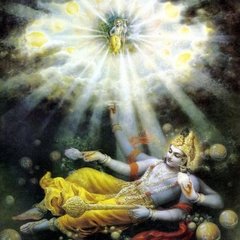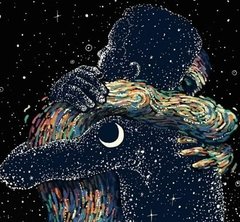Search the Community
Showing results for tags 'duality'.
Found 8 results
-

How would you counter this hypothesis to the ‘Enlightenment’ idea?
galen_burnett posted a topic in General Discussion
So there is an argument that happiness only exists if it has suffering as a reference point. This is a conclusion that can be arrived at if you consider that the idea of everything existing in pairs and as opposites—the idea of Yin and Yang—is fundamental to existence; in this argument, happiness and suffering (I’ll say joy and pain hereafter as they’re shorter words) are not considered to be exceptions to this rule of Yin-Yang opposites, but rather are just another manifestation of Yin and Yang—albeit the most fundamental manifestation of Yin-Yang, as what experience could ever there be in Duality without shades of joy and pain? The argument is that joy can never be separated from pain because joy and pain define each other; they are a pair of opposites, like North and South; they refer to each other to give themselves meaning; without one the other ceases to exist. If all you ever saw was the colour blue then before long you would forget entirely what the other colours were, and the idea of colours, along with the colour blue itself, would then cease to be; considering, say, the greatest joy to be the colour blue in this analogy, the greatest pain as red, and all the degrees of pain and joy in-between—‘rather pleased’, ‘fine’, ‘bit off today’, ‘pretty annoyed’, etc.—being represented by the other colours. [*I know red and blue aren’t directly opposite each other on the colour-wheel, I guess cyan and orange are really, but it suffices for this post.] What’s more, in Eastern thought itself it’s considered that opposites give rise to each other in rotation: mess gives birth to cleanliness, which then becomes messy again; night to day, to night; pressure to expansion, closing into pressure once more; and so on. In this argument it is assumed that joy and pain behave in the same way: the most perfect heaven can become a hell of tedium and constriction if you stay there for too long; and the most violent hell can be inured to and got used to with enough time, until it even becomes a place of amusement and intrigue. Also, in this argument it is assumed that any and all levels of joy—even the very highest, most ultimate, degree of it imaginable—are still just ‘joy’, that all degrees of joy are as valid as each other; there is no splitting of hairs in this argument regarding the possibility of some greatest happiness existing ‘outside the bounds’ of ‘joy’—such a notion doesn’t make any sense from this point of view. I should note here that in this argument while all degrees of joy are considered as ‘valid’, it is accepted that not all beings will gain the same degree of joy from the same stimulus: a TV soap-opera may delight some people while be anathema to others, and meditation may be enormously relaxing and revitalising for some while incredible boring and dull for others; but this point is universally agreed upon by most, I think. There is the further matter of how ‘refined’ each degree of joy (or pain) is, and this actually comes relatively close to agreeing with the concept of an ultimate happiness actually, but stops short enough to still disagree with it considerably—but it is a tangent for another time. The notion of attainment of ‘perpetual-bliss’ is common throughout Eastern spiritual-practices and philosophy: it can be found in yoga, in Buddhist philosophy, and in Daoism (the attainment of Dao), going by various names (I’ve cited some of them in the tags of this post). It is the notion that, with diligence etc. , a person can transcend the plane of Duality and merge with the Non-Dual, whereat awaits perfect bliss and harmony for them, which they may abide in forever after. If we accept the argument that joy and pain are essentially dualistic opposites, then how can we sever them, throw out one, keep the other and then escape into Non-Duality with it? How can we smuggle a dualistic entity—i.e. joy—into the realm of Non-Duality? Wouldn’t Non-Duality be devoid of all experience whatsoever—blanker than blank—as all experiences in existence, including all forms of joy and pain, belong to Duality? even ‘experience’ itself can be thought of as being a dualistic opposite to ‘non-experience’ (though non-experience is impossible to comprehend). Rather than, say, Sahasraha (see Tantric yoga stuff) being an experience of the Non-Dual, isn’t it more apt to consider it as an experience of boundlessness, of formlessness, of unity, of mergence, of the infinite? which qualities are still within the realm of Duality, and therefore the Sahasraha experience itself could still be considered as a dualistic experience. In addition, if the happiness of Nirvana—said to be beyond the ‘illusory’ joys of Samsara—resides in the incomprehensible realm of the Non-Dual, then how can anything—including ‘illusory’ joys of Samsara—be compared to it? If it is beyond all things, how can those who tell of it liken it to anything at all, including to ‘illusory’ joy? How can they say “you know what ‘nice feelings’ are, right? Well Nirvana is ‘nice feelings’ times 100!” when Nirvana is supposed to be completely unlike anything that can be experienced in Duality, including pleasure and pain; so surely, then, there is no way to say that Nirvana is ‘nice’, as ‘nice’ is ‘dual’ and Nirvana ‘non-dual’; and yet, are we not in Eastern spiritual-practices encouraged to seek Nirvana for it being supposedly ‘nice’? So how would you counter this argument and uphold the notion of attainable ‘perpetual-bliss’? Have you met anyone who claimed to have attained it? If so, what made you believe them? If that person was indeed sincere in their claim to that experience, how did that person know themselves that they were not just experiencing a very long ‘high’? Also, how could that person have been operating in Duality if they had entered Non-Duality? If you believe in it after having read or heard about it, what that you have read or heard counters this argument? If both the experience itself and any attempt to explain the experience are beyond logic—due to ‘logic’ being tethered to Duality, and ‘ultimate attainment’ residing beyond Duality in Non-Duality—then how do you know about it in the first place and how are you able to talk about it or think about it—as knowledge, thought and speech all belong to the great despot of Duality—? If it is an intuition of yours that it is real, are you really willing to surrender your whole life in an attempt to attain something based on a gut-feeling? If you deduce its existence by extrapolation of your own life experiences—spiritual ones included—how do you do so?: what about your own experiences hints at the possible attainment of ‘perpetual-bliss’? There is a further argument against the notion of ‘perpetual-bliss’ which concerns itself with permanence-impermanence and with beginnings and ends and ‘ultimate attainments’, and though the argument in this post touches on this—through considering how opposites continually roll and transform into one another, and through questioning the true nature of an Enlightenment experience such as Sahasraha a couple paragraphs above—it’s divergent enough to leave it out here. As an aside, I am not debating here that great spiritual-experiences exist—they certainly do—; neither am I debating the immortality of the soul nor of consciousness—it certainly is—; neither am I denying enlightenment when considered as the notion of a progression through higher and higher levels of awareness, ability and intelligence; this is just an argument against the idea of the existence and attainment of ‘perpetual-bliss’.- 568 replies
-
- 3
-

-
- enlightenment
- samadhi
-
(and 8 more)
Tagged with:
-
Agamas "This is the Direct Awareness of the Self, Graciously expounded to Guha by Ishvara Himself [Shiva], The foremost and first Lord, Seated as the Self in my heart." ~Ramana Maharshi --------------------------------- Witnessing of the Atman "Atma Sakshatkara means, "witnessing of the Atman", or Self-realization, and is the name of the chapter within the jnana pada(knowledge section) of the Sarvajnanottara Agama, an obscure Upagama(subsidiary Agama) text. The sublime non-dual teaching of this text is in the form of a dialogue between Shiva and Guha(Kartikeya Murugan) where Lord Shiva is the Supreme Guru and Guha is the Disciple. The text was discovered by Sri Ramana Maharshi, who translated the chapter titled Atma Sakshatkara into Tamil sometime in the early 20th century, and also composed the introductory benediction verse. The English translation of that chapter is translated by Dr. H. Ramamurthy."
-

Why the concept of an unlimited one being is in the domain of Duality
dwai posted a topic in General Discussion
I've been reading arguments about what comprises a "sage" in the non-dualism perspective. The two options (perhaps there are a few more) are as follows - A sage is one who is free from the bondage of samsara, because they have realized their innate nature, and know without any iota of doubt that this innate nature is non-dual. All concepts and perceptions are merely projections of itself (Objectless Consciousness) on itself, and are ultimately devoid of "realness". Knowing this, the sage doesn't attach to any position (conceptions) and remains an atemporal and non-spatial presence, free from suffering (attachment to pleasures or rejection of pains). A sage is one who is free from the bondage of Samsara, but "vows" to turn their back from the above realization, and work towards the liberation of all other beings, using their now realized freedom to harness infinite power in this universe, and effect changes as needed - become a "ruler" sage. My contention is as follows - Once the Sage realizes that they are absolutely and unequivocally Non-Dual, there is no scope for the will of an independent infinite being that does actions to affect the limited beings (who are not yet realized). Any action that they do as an individual being (however unlimited their power might be) is going to be in the domain of dualism and therefore limited (because the domain of dualism is limited). Such an individual might be what is called "Ishvara" (God) or an Avatar etc etc, but they too are limited in nature (as its the limitation of the upadhi - limiting adjunct - the body, etc). They might be able to bend the "normal" rules (of space and time), but ultimately if they choose to remain bound in space and time (by opting to "bend" the rules), they remain dualistic. On the other hand, if a body-mind complex (Jiva) who is liberated (Jivanamukta) does not act of a limited volition, but all action becomes just happenings in the dualistic world (happenstance), then that qualifies as non-action (wu wei, nishkama karma) and therefore outside the bounds of karma and the mechanism of duality (maya). Happy to read more thoughts on this topic...I hope I wasn't clear as mud -
I'm curious what examples of absolutes others harbor as I find the concept to be inapplicable to all but a few very abstract concepts related to experiences which are really beyond words. It's usually a red flag and thus unsettling for me whenever a conversation enters into notions about complete, absolute, unchanging, never ending, undiminishing, etc, anything. Specifically I find the seemingly inherent notion within the common definition of absolute of any thing completely independent of all other things to be impossible. As to unchanging, or undiminishing... perhaps a few conditions I have experienced seem to fit the notion as I list below, but only from my current perceptual model, which is far from absolute and thus, for me, is not really considered definitive... it all seems very subjective and relative. Anyway, here's what the all mighty dictionary says Absolute: as an adjective: 1: not qualified or diminished in any way; total. "absolute secrecy" 2: viewed or existing independently and not in relation to other things; not relative or comparative. "absolute moral standards" as a noun: 1: a value or principle that is regarded as universally valid or that may be viewed without relation to other things. "good and evil are presented as absolutes" The notions of second definition of the adjective version and the noun definition of absolute moral standards and good and evil being absolute are ridiculous in the extreme for me. Utterly human mind notions that are fluid in nature based on cultural, familial and individual filters and as malleable as the context in which they are used to serve the needs of the one speaking in the current moment. Without any hardcore certainty, I consider my experiences of the concepts of Void... Emptiness... Clarity... and Awareness as potential examples for absolutes. These seemed to embody for me, as I recall them, to be experientially beyond the potential for diminishing and thus seemed to be unchanging which would satisfy one of the inherent conditions of the definitions above for an absolute. This however is based on my recall and memory of the experience and so pulls in all of my perceptual filters based on my reality tunnel and thus adds a rather high degree of malleability. I really can't fathom how they are in any provable way, independent from each other, or the rest of experiential perception based 'reality', nor can I conceive of a manner in which anyone could establish that they are, in fact, independent. So what is an absolute?
- 152 replies
-
Do you experience that Yin and Yang are separate 'things'? Any more, I see them not as separate, or opposing things, but as the expression of Tao, interpreted as varying degrees of polar extremes and appearing separate based on a perspective, which is shaped by human senses and cognitive filters of family, culture, etc. For some time now, I have not been able to reconcile any 'things' that are separate. The ten thousand things... are they separate? For me, where I am now, it seems not. They are more like facets to the gem of the expression of tao source and each facet may have the strong illusion to my senses of being separate, based on how I may perceive it in a given moment, yet remain unerringly part of source, never separated from it, nor independent of it. And for the record, I have no intentions of deleting or modifying anyone's statements in conversations I initiate, ever. If something breaks the rules of the forum, I'll let the mods handle that. Speak your mind freely in any thread where I am the OP, please... how else do we get to the solid potential truths if we don't wade through some muck?
-
As tongue in cheek as this may appear... I honestly think this is a great layout of a valid modern perspective of the straw dog aspect of the Tao.
-
Stanhope's reaction to how an atheist responded to Wolf Blitzer in an interview about her destroyed home is awesome, as is his take on why responded the way he did.... funny how hate can make you do some really nice things... lmao
-
The game of being has a 'time-out' box where beings enter not to be... the dreamless dream. Not-being involves accepting 'what is not' as being and holding "what is" as not being. 'Dualistic' notions of not-being reflect being within the dream. At all time Beings being none-beings remain within the not-being being unaware of being until the moment that what is impossible becomes possible and the impassable passage be passed. At any time a being can choose to wake up from the dreamless dream though thats impossible for a none-being to accomplish, for those who think they can't do it will not do it even if they could do it. For those who know, I have little to add for those who do NOT know I will say: - the man who refuses to see, and wishes not to see, sees without seeing where as the blind man, sees without seeing Some see 'seeing without seeing' as the key to see and to not see some know the elephant as the elephant! - "A ray of light suffices to enlighten and disintegrate darkness". Lies just disintegrate in the presence of the truth... and those who know and recognize the truth can experience all the possibilities and realities with a single thought (feeling understanding act) though they do not have to experience it all to know it all. I would like each and everyone to know the truth and be enlighten... and keep on watering the plants and chopping wood... What would you like be? Can a finite temporary experience include it all while also transcending the finite temporary experience? The enlightened know from experience the singular valid answer... believers know the stories told until they experience a singular transcendental enlightenment instant ... of course there are all sort of storytellers with all sort of captivating lines and all sort of motives... which do you seek to cultivate and contemplate.
-
- 1
-

-
- duality
- singularity
-
(and 3 more)
Tagged with:



